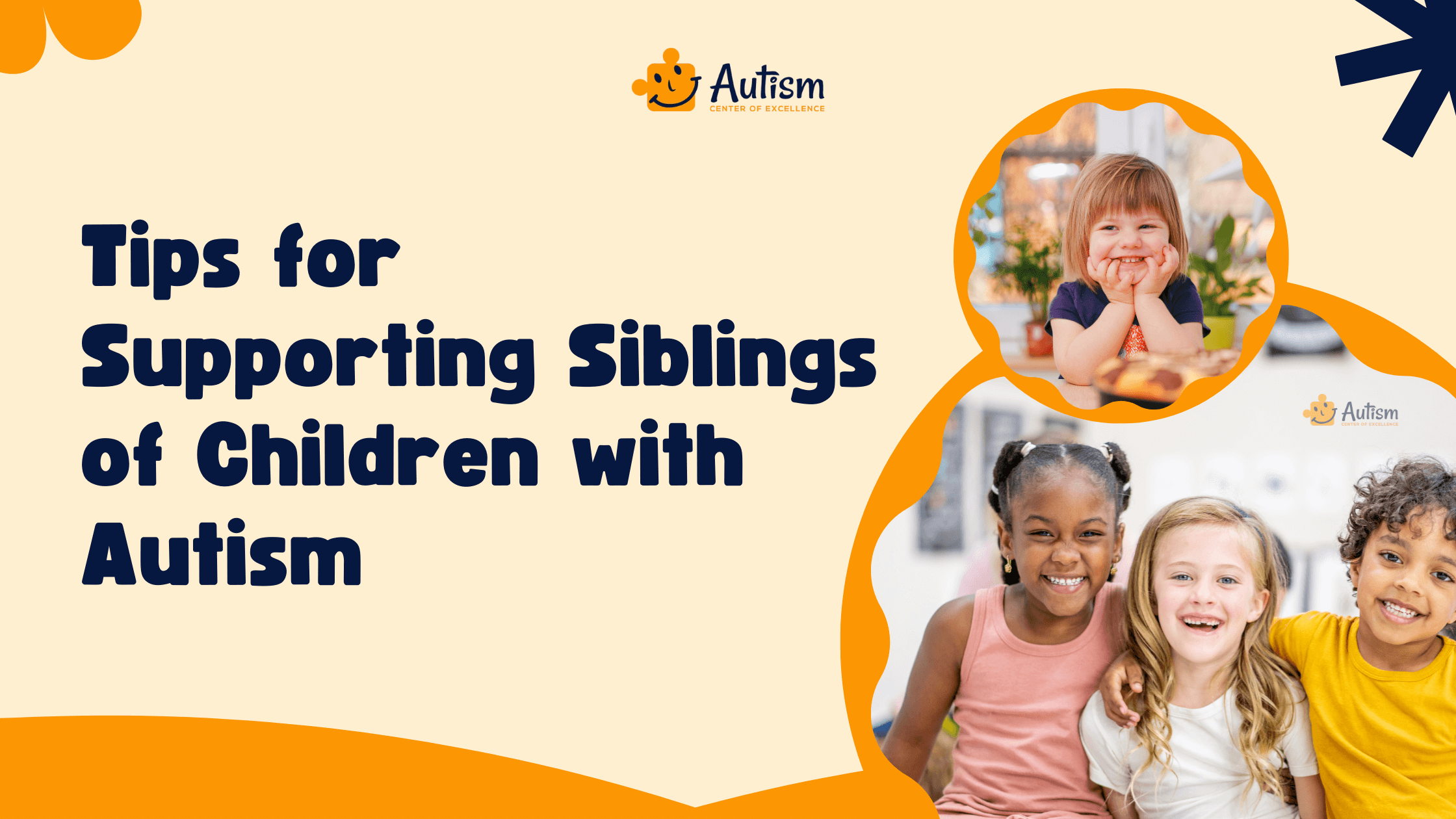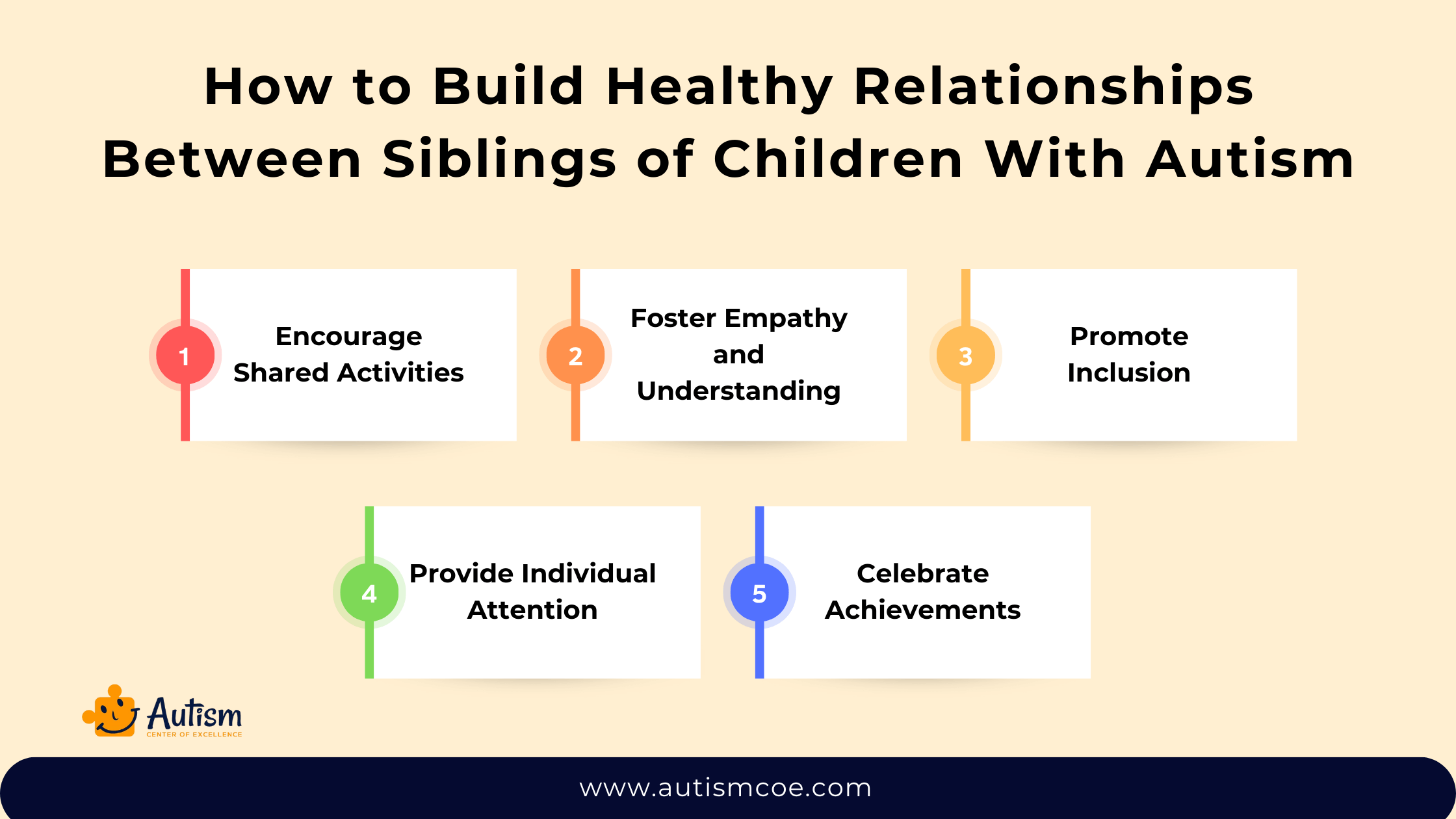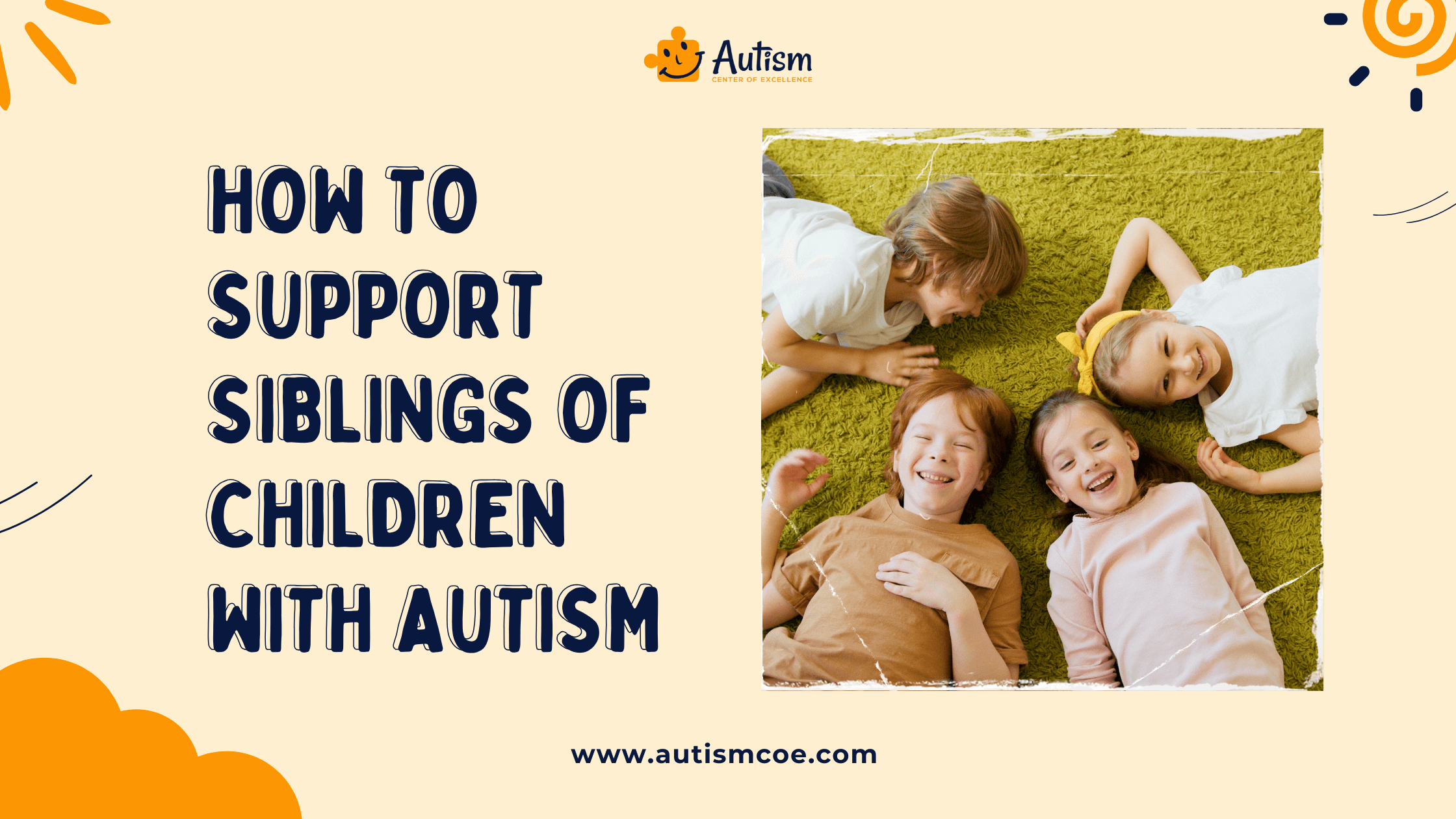Siblings are probably the most important people in children’s lives who have Autism as they are their friends and playmates and provide emotional support. However, siblings of children who have Autism can also encounter difficulties. Thus, we should help siblings of such kids with their understanding of what they are going through. Parents along with other caregivers must understand the challenges that siblings of Children with Autism may face and realize how important it is to help them.
Sibling bonds are really special, but they can get complicated when one of them has Autism. When dealing with their sibling’s unpredictable behavior and the extra care and resources that are frequently needed, siblings may experience feelings of uncertainty, anger, or even jealousy. In addition, as they try to strike a balance between their affection for their brother and their desire to blend in with their classmates, they could feel awkward or socially isolated in public. It is crucial to acknowledge these obstacles and offer siblings tools and support in order to enable them to flourish within their own family dynamics.
Educating Siblings About Autism
The most crucial way we could assist the siblings of the children with Autism would be to educate them about the disorder. Through the provision of early-level information for children of the family, parents give the opportunity to know of the sibling’s behaviors and difficulties, and, as a result, boost empathy and acceptance in the family.
Steps for Talking with Your Children About Autism:
- Initiate by having an open and honest talk with your children regarding Autism.
- Describe that Autism is a developmental disorder responsible for the unique way that their sibling perceives the world.
- Use simple words as well as real-life examples to help them understand the concept, never forget to invite them to ask questions.
- Don’t forget about reading books or watching videos with your child that are based on characters with Autism in a good way.
- Highlight the strengths and uniqueness of their siblings with Autism.
- Convey that everyone has their strong side and dark side.
- Produce an atmosphere of understanding and tolerance in the family about Autism.
- The home environment should be a comforting place where they feel appreciated and respected.
Not only parents should teach their other kids about Autism but they need to also include them in the therapy sessions and activities, whenever it is possible. This way they will learn about the circumstances and struggles of their siblings and maintain their family closeness through inclusion.
Overall, this will not only enable parents to prepare their children to comprehend and empathize with their sibling with autism but also to look out for and support them. By means of open discussion, positive reinforcement, as well as inclusive interactions, families can build an environment that is welcoming and where all children feel that they are valued and appreciated.

Tips for Supporting Siblings of Children with Autism
Here are some tips for supporting siblings of children with Autism:
Foster Open Communication:
Promote communication in the family that is open and honest. First and foremost it is important to establish an open, safe space where siblings can freely share their views, opinions, and emotions, without fear of being judged. Listen to what they have to say and validate their emotions thereby reassuring them they can experience a catalogue of emotions including frustration and sadness.
Acknowledge Feelings:
Figure out and acknowledge the emotions of the siblings. Realize that they may feel a range of emotions including love, frustration, jealousy, and confusion, evolving into complex characters. Encourage them to acknowledge their emotions and reassure them that their feelings are understandable and okay to have.
Provide Individual Attention:
Safeguard siblings from not being overlooked by parents through providing each of them equal time and attention from parents. Create an entertainment space where you can spend some alone time with the child and do things he or she enjoys. Use this opportunity to let them be who they really expect themselves to be. This serves as an element to strengthen the relationships between the parent and child and to also send the message that each child is of worthy value.
Seek Outside Support:
There is no need to hide your emotions, just let them out, and don’t be afraid to seek additional assistance. Get in touch with the people in the support group, a therapist, or a counselor who are familiar with the autism spectrum and the specific needs of the families with children on that spectrum. These specialists may advise neurotypical siblings and show them strategies and resources that help to provide support to them and handle any problems that can arise.
These tips can be seen as a means of constructing a background where the brothers and sisters know themselves as valid and can consider their connection to their autistic sibling without any problem.
Addressing Challenges Faced by Siblings of
Children with Autism
Siblings of children with Autism often face unique challenges that can impact their well-being and family dynamics. Addressing these challenges is crucial to ensure that all members of the family receive the support they need. Here are some practical tips for parents to support their children:
Understanding and Acceptance:
Help siblings understand and accept their brother or sister’s autism. Provide age-appropriate explanations about Autism and its effects on behavior and communication. Encourage open discussions about feelings and concerns, and reassure siblings that it’s okay to have mixed emotions.
Managing Feelings of Frustration:
Siblings may experience feelings of frustration or resentment due to the attention and resources allocated to their sibling with autism. Validate these feelings and provide opportunities for siblings to express themselves in a constructive manner. Encourage healthy coping mechanisms such as journaling, talking to a trusted adult, or engaging in relaxing activities.
Promoting Independence:
Empower siblings by encouraging their independence and autonomy. Assign age-appropriate responsibilities and tasks that allow them to contribute to the family and build self-confidence. Recognize and celebrate their achievements to reinforce their sense of competence and value.
Fostering Sibling Bonding:
Facilitate opportunities for positive interactions and bonding between siblings. Encourage shared activities and interests that promote cooperation and teamwork. Create a supportive and inclusive family environment where all siblings feel valued and appreciated for their unique strengths and contributions.
Seeking External Support:
Don’t hesitate to reach out to professionals and support groups specializing in sibling relationships and autism. They offer valuable guidance and resources to address challenges and foster positive sibling dynamics. AutismCOE provides tailored support services, including counseling and sibling support groups, to help siblings navigate their experiences and strengthen family bonds.
By addressing the unique challenges faced by siblings of children with Autism and providing them with the support they need, parents can promote resilience, understanding, and harmony within the family unit.
Join Our Weekly Newsletters!
Subscribe now to stay updated with our latest email updates.

Building Healthy Relationships between Siblings of Children with Autism
Siblings play a crucial role in the lives of children with Autism, providing companionship, understanding, and support. Fostering positive relationships between siblings is essential for creating a supportive family environment where all members feel valued and understood. Here are some strategies to encourage bonding and support between siblings:
1️⃣ Encourage Shared Activities:
Encourage siblings to engage in shared activities that they both enjoy. Whether it’s playing a game, going for a walk, or doing a craft together, shared experiences can strengthen their bond and create positive memories.
2️⃣ Foster Empathy and Understanding:
Help siblings understand their brother/sister’s autism by explaining it in age-appropriate terms. Encourage empathy and understanding by discussing how autism may impact their sibling’s behavior and emotions.
3️⃣ Promote Inclusion:
Encourage inclusion and participation in family activities and routines. Involve siblings in decision-making processes and ensure that everyone’s needs and preferences are considered.
4️⃣ Provide Individual Attention:
Set aside one-on-one time with each child to ensure they feel valued and supported. This individual attention allows siblings to express themselves freely and strengthens their connection with parents.
5️⃣ Celebrate Achievements:
Celebrate both small and big achievements of each sibling, including those with autism. Recognize their efforts and accomplishments, fostering a sense of pride and self-worth in each child.
By fostering positive relationships between siblings and providing opportunities for bonding and support, parents can create a nurturing environment where all children feel loved, understood, and valued.
Frequently Asked Questions & Answer
How Can a Family Support a Child With Autism?
Families can support a child with Autism by creating a structured and nurturing environment, understanding their unique needs, providing access to therapy and resources, promoting social interactions, and advocating for their rights and inclusion.
How Can I Help My Autistic Child With Siblings?
Parents can help their autistic child with siblings by fostering understanding and empathy, encouraging positive interactions, providing individual attention, addressing any conflicts or challenges, and promoting inclusive family activities.
How Are Siblings of Autistic Children Affected?
Siblings of autistic children may experience a range of emotions and challenges, including feelings of responsibility, isolation, or frustration. They may also benefit from developing empathy, patience, and understanding.
How Does Having a Child With Autism Affect the Family?
Having a child with Autism can impact the family dynamics, routines, and stress levels. It may require adjustments in parenting styles, financial resources, and social activities while fostering resilience, patience, and compassion.
What Are the Benefits of Having a Sibling With Autism?
Having a sibling with autism can promote empathy, understanding, and acceptance. It can also lead to stronger family bonds, increased tolerance for differences, and opportunities for personal growth and development.
Conclusion
In conclusion, supporting siblings of children with Autism is vital for creating a nurturing family environment. By promoting open communication, acknowledging feelings, and seeking external support when needed, parents can help siblings navigate challenges and strengthen their bond. It’s crucial to foster understanding and empathy within the family, ensuring that all children feel valued and supported. The Autism Center of Excellence offers resources and support to assist families in this journey, providing guidance and strategies for promoting positive sibling relationships and addressing the unique needs of each child. AutismCOE provides ABA Therapy, ABA for Early Intervention, ABA for School Readiness, Speech Therapy, and Occupational Therapy services for children aged 2 – 14 years in-home as well as in center-based environments.
Please Note: The content of this blog is for informational purposes only and should not be considered a substitute for professional medical advice, diagnosis, or treatment. Consult a qualified health care professional for personalized guidance tailored to your specific situation.

Bhavika Bhasin
Bhavika Bhasin is the Research and Marketing officer at AutismCOE. She works with children and adults with ASD. Her clinical research includes evaluating various available autism screening and diagnosis methods and their efficacy. She is currently developing a novel screening exam that is indicated to be more accurate than the existing available exams. She is also writes articles papers for various publications.


